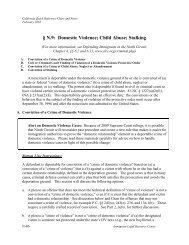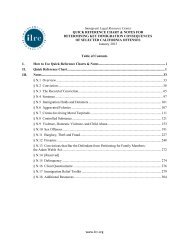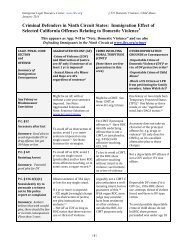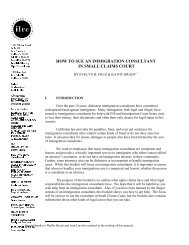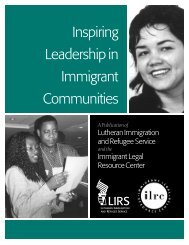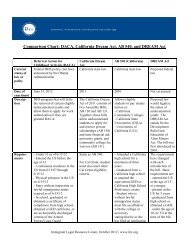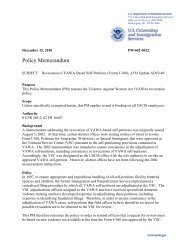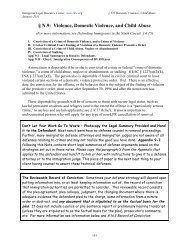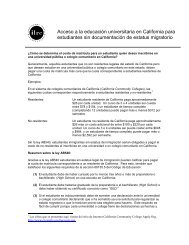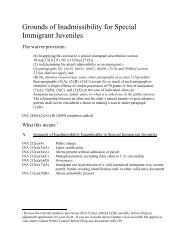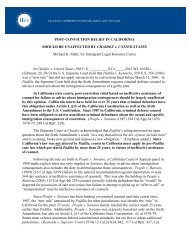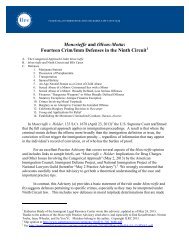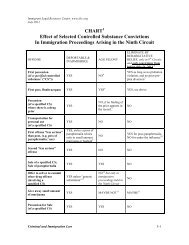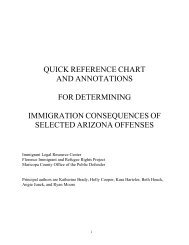quick reference chart and notes for determining immigration - ILRC
quick reference chart and notes for determining immigration - ILRC
quick reference chart and notes for determining immigration - ILRC
You also want an ePaper? Increase the reach of your titles
YUMPU automatically turns print PDFs into web optimized ePapers that Google loves.
Cali<strong>for</strong>nia Quick Reference Chart <strong>and</strong> Notes<br />
February 2010<br />
1. The United States Citizen (“USC”) or United States National Defendant<br />
a. Who is a U.S. Citizen?<br />
Citizenship by Birth in the United States or Other Areas. Any person born in the United<br />
States is a U.S. citizen, except <strong>for</strong> certain children of <strong>for</strong>eign diplomats. Persons born in Puerto<br />
Rico, Guam <strong>and</strong> U.S. Virgin Isl<strong>and</strong>s, as well as those born after November 4, 1988, <strong>and</strong> in many<br />
cases be<strong>for</strong>e, in the Northern Mariana Isl<strong>and</strong>s also are U.S. citizens.<br />
Naturalization to U.S. Citizenship. A noncitizen may apply to become a U.S. citizen<br />
through naturalization. A naturalization applicant must establish that he or she has been of<br />
“good moral character” <strong>for</strong> a certain period; often the period is three or five years, but certain<br />
military personnel require less. In almost every case, except <strong>for</strong> certain Armed Services<br />
members, an applicant <strong>for</strong> naturalization must be a lawful permanent resident.<br />
Most crimes that trigger the inadmissibility grounds also statutorily bar the person from<br />
establishing good moral character. This is not so dangerous: the noncitizen simply must wait <strong>for</strong><br />
the, e.g., three or five years to pass since the conviction be<strong>for</strong>e filing the naturalization<br />
application, <strong>and</strong> take care not to travel outside the U.S. until she is a citizen. It is far more<br />
damaging <strong>for</strong> a noncitizen who is deportable <strong>for</strong> a crime to apply <strong>for</strong> naturalization. It is likely<br />
that the naturalization application will be denied <strong>and</strong> the person <strong>quick</strong>ly will be referred to<br />
removal/deportation proceedings. For further discussion of naturalization, see books such as<br />
Defending Immigrants in the Ninth Circuit, Chapter 11 or Naturalization: A Guide <strong>for</strong> Advocates<br />
(www.ilrc.org).<br />
Derived or Acquired Citizenship. Your client might be a U.S. citizen <strong>and</strong> not know it. Many<br />
persons born in other countries unknowingly inherit U.S. citizenship from their parents under<br />
one of a few provisions of nationality law. In this case, criminal convictions are not a bar <strong>and</strong><br />
good moral character is not a requirement; the person received the status automatically.<br />
There are two threshold questions. If the answer to either question is yes, more research<br />
needs to be done to determine whether the person actually is a U.S. citizen, based on date of birth<br />
<strong>and</strong> other factors. A non-profit agency or <strong>immigration</strong> lawyer may be able to help you. The<br />
questions are:<br />
‣ At the time of his or her birth in another country, did your client have a gr<strong>and</strong>parent or<br />
parent who was a U.S. citizen? If so, your client might have inherited U.S. citizenship at<br />
birth, called “derived citizenship.”<br />
‣ Might your client have been under the age of 18 when, in either order, she became a<br />
permanent resident <strong>and</strong> a parent naturalized to U.S. citizenship? If so, your client might<br />
have automatically become a citizen at the moment the second condition was met, in a<br />
process called “acquired citizenship.”<br />
Immigrant Legal Resource Center N-15



